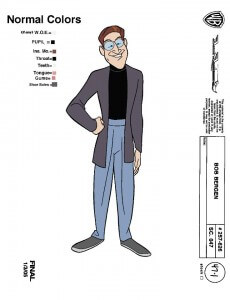A few days ago, I asked the members of the Voice-Over Friends group on Facebook (UPDATE: this group’s been closed) to share some tips on improving our voiceover businesses. There were loads of really valuable responses, and I included them in a recent post called 30+ Ways to Strengthen Your Voiceover Business. One entry was added to the group a little too late to make into the post, but it certainly deserves to be shared. It was written by Bob Bergen, whose talent is only exceeded by his humility. This guest post is a reprint of those comments, shared with Bob’s permission.

The Wisdom of Bob’s Experience
I’m a tad late to the party here, but I think one thing most lack in pursuing voice-over is “specifics.” If you answer “I just want to work” when asked, “What do you want to get out of pursuing voice-over?” you are just one of the masses wandering around probably not working because your goals are too vague. Specific goals will bring specific results! Want to work in promos? “I want to work in promo” is not even specific enough. “I want to be the promo voice of CBS comedies!” That’s specific! Now, how do you take that specific goal and attempt to achieve it? Most will start with a promo demo, maybe post it on their website, make it available to any and all of their multiple regional agents, etc. Again, vague steps that will probably bring vague results. For a more specific game plan, try a business strategy I call Backwards Thinking.
Most people look to achieve goals starting from where they are now and work from there up the ladder to where they hope to one day be. You will miss some specifics doing this, and quite frankly, again, just be one of the masses spinning their wheels but not sure why. With Backwards Thinking, instead of looking at the end result from the bottom up, look at it from the top down.
Think Backwards
Get a large legal pad and write your end result goal at the top:
I am now the voice of CBS Comedies!!!
Mozel tov! How’d you get there?
Next line below write:
I tested for the job.
Yay! How’d you get the opportunity to test for that gig?
Next line below you write:
My agent submitted me for the job.
OK, great! Why did your agent submit you for that gig?
Next line below:
My agent had a good clear understanding of my specific goals in voiceover, which I not only laid out at the time I interviewed with him, I’m very conscientious about reminding him of my goals as well as arming him with the proper ammunition and marketing tools to get out to the proper buyers. Since then I’ve attended ProMax along with my agent, and between the two of us, we’ve networked with promo producers and buyers (including the executives at CBS in charge of booking the promo talent!!!) with a proactive, specific campaign so we come to mind when their current promo voice’s contract expires.
Good! Nice specifics. But lots of folks out there who want to do promo also have agents who don’t do diddly to get them promo auditions, let alone promo gigs.
Next line down you write:
I knew there are only a handful of agents out there whom promo buyers work with and I specifically marketed to secure one of them.
Very good! How’d you find these agents?
Next line:
I researched Voicebank to find the agents who are strong in promo.
Well, whoopee! That info is available to anyone and everyone! So you found the agent. How did you get them to take notice?
Next line:
I made my demo with a producers whose work the agents respect. Not a homemade demo to save money, and not produced by an all-purpose demo producer who may not know the specifics of the promo industry. And I got referred by people the promo agents respect and trust.
OK. How’d you find this demo producer? How’d you find the right people to refer you?
Next line:
I researched the working promo actors in the business, studying their demos and their marketing tools. I friended them on Facebook, drinking in any and all advice I could, from coaches to marketing. I studied acting, improv, voiceover, and specifically Promo VO extensively. I got to the point where I knew I was as good or better than everyone else either working or pursuing Promo. I prepared. And by the time I was demo-ready, I’d immersed myself in this business to the point where I had a huge pool of mentors and professionals I could use as referrals, etc.
Make it Work For You
Now, I stopped in the middle, and I left a few specifics out. And I’m sure you can probably think of your own specifics that work better for you. Backwards Thinking is a strategy that allows you to produce a clearer and more achievable game plan. Tangible tasks. And you can use this for any genre of voiceover, from commercial to animation, narration, etc. I would say most who pursue VO are not this specific. This is why most don’t work.
Bob Bergen is a massively talented voiceover actor who has distinguished himself outside the recording booth by generously sharing the benefit of his decades of experience with fellow voice actors.The FAQ page on Bob’s web site is filled with some of that valuable information.
In 1990, Bob’s dream came true when he joined a handful of actors who share the job of voicing The Looney Tunes. Over the years, Bob has voiced Porky, Tweety, Marvin the Martian, Henry Hawk, Sylvester Jr., and Speedy Gonzales in a variety of feature films, albums, toys, games, and television series. Bob’s voice has also been heard in hundreds of commercials, including McDonald’s, Mitsubishi, Geico, Petsmart, Publix, and Albertson’s. His promo résumé includes Disney Channel, NBC and FOXKids. He’s the imaging branding voice for radio stations throughout the US. Animated features include Tangled, TinkerBell, Spirited Away, A Bug’s Life, Iron Giant, Cars, The Emperor’s New Groove, Up and Wall-E, to name a few. He voices Luke Skywalker for LucasArts interactive games, as well as all 3 Robot Chicken: Star Wars specials. He’s supplied special vocal effects for dozens of films, including Gremlins, Army of Darkness, Dunston Checks In, Fright Night 2, Honey, I Blew up the Kid and Santa Clause 2 & 3.




Comments on this entry are closed.
This is a great post on backwards thinking and what it takes to really make that successful. Very specific, very logical, very workable. Fantastic all the way around! Thanks!!
I love this! Backwards thinking makes total sense. Thank you Doug and a big thanks to you too Bob!! Awesome post!
Forward thinking from Bob Bergen. It’s back to the future!
Deconstruction is a great way to have hindsight as foresight!
Thanks, Doug! Great stuff as always, Bob!
Backward is the new Forward. Thanks to both Bob and Doug for a great bit of insight.
wow! what a wealth of knowledge. This is a great marketing strategy to apply to any industry…research your target audience and network with people who have experience and influence.
Brian Lee
Great voiceover blog article. Bob’s a talented guy and there’s a lot to learn from him
Great post. Excellent advice. Think it might be time to do a little backwards thinking of my own.
Great post, but what is Joe Cipriano going to do now that I’M the voice of CBS comedies?!?